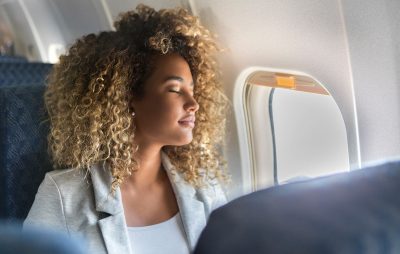
If you’ve ever found yourself wide awake in the middle of the night (or ready to snooze mid-afternoon) after traveling from one time zone to another, you’re intimately familiar with jet lag. Your body’s circadian rhythm is working based on the time at home, not local time. And that can have pretty cascading effects, at least for a few days. But all is not lost! We asked a few sleep experts how to adjust to different time zones so you can get your sleep/wake cycle back up to speed.
Why Is It Difficult Adjusting To Different Time Zones When Traveling?
It all comes down to that amazing mechanism — your circadian rhythm. This is the system that dictates when you feel tired and when you feel awake and alert, and it’s synced to the time zone where you live.
“It uses environmental and behavioral cues to understand the time of the day — for example, the timing of sunrise and sunset, the time we eat meals, the work schedule, exercise,” explains Dr. Carleara Weiss, a member of the American Academy of Sleep Medicine and sleep advisor to Pluto Pillow. But the biggest cue is what’s known as photoperiod, or the duration of natural light between sunrise and sunset.
“The changes in photoperiod desynchronize our circadian rhythm when we travel across different zones,” says Weiss. In other words, your internal clock no longer matches up with the light cycle in the new time zone, meaning your energy levels will correlate with the time zone you came from rather than the one you’re in. This effect can leave you feeling wired at night and sleepy during the day.
Additionally, the length and direction of travel across time zones will have a bigger impact the farther you go. “Even small changes in time zone influence our physiology; however, more dramatic changes — more than six hours — tend to impose more limitations until our bodies adjust to the new photoperiod at the new location,” Weiss explains.
Something else to keep in mind: “It’s more difficult to adjust when you travel east and ‘lose’ time than when you travel west and ‘gain’ time,” says Stephen Light, certified sleep science coach and CEO/co-owner of Nolah Technologies. “It’s harder to advance your internal clock and feel tired earlier than it is to delay your internal clock and stay alert later.”
How Long Does It Take To Adjust To A New Time Zone?
The standard rule of thumb is that it takes the body one day to adjust to every hour of time zone difference. Still, Light cautions that there isn’t currently enough research to validate this conventional wisdom, so use it as a benchmark to help plan ahead for travel. Check out our jet lag calculator for a personal sleep plan that will help you reduce travel fatigue before you jet off.
Is Changing Time Zones Bad For Our Health?
We won’t lie — you may not feel great when you change time zones. “Jet lag, and this circadian rhythm desynchronization, has negative impacts on health, including fatigue, headache, dehydration, changes in appetite, constipation or diarrhea, sleep disturbances, insomnia, and mood swings,” says Weiss.
Fortunately, these effects are usually temporary and only linger before your internal clock readjusts based on exterior signals in the new environment. “Jet lag usually only has long-term health effects for those who change time zones often — for example, pilots, flight attendants, and frequent business travelers,” Light explains. “It can lead to chronic insomnia and circadian rhythm disorders.”
Tips for Adjusting To A New Time Zone
- Plan ahead. Weiss says it’s really important to adjust bedtime and wake-up time to the new time zone in the days before your trip. Do it gradually using 30-minute increments. And use our jet lag calculator to get started!
- Stay awake until you’re close to bedtime in your final destination. It might be challenging to stay awake, but doing so means you can fall asleep at the appropriate time in the new environment, which may help get your circadian rhythm back on track a little faster.
- Get comfortable on the plane, says Dr. Shelby Harris, Sleepopolis’ director of sleep health. This will give you the best chance at catching up on those precious zzz’s before you hit the ground running in your new time zone. However, Harris says it’s important to use naps “thoughtfully,” taking into consideration the time zone you’re heading toward to help you get through the day once you land.
- Time your meals. Eating and digestion promote wakefulness and affect your circadian rhythm. “To adjust to a time zone, try to eat breakfast, lunch, and dinner at your normal times based on the local clock,” advises Light.
- Try some sleep remedies to get yourself back on track. Remedies like melatonin, lavender, and tart cherry juice may help signal your body that it’s time to doze off at the appropriate local time.
- Avoid alcohol. Alcohol may work in the short-term to make you nod off, but research shows it lowers sleep quality and efficiency.
- Consider using melatonin. The Mayo Clinic says melatonin* has been shown to help people get to sleep at times outside of their typical sleep schedules, making it a good option for jet-lagged travelers.
- Set yourself up for success at bedtime that first night with proper sleep hygiene. That means managing light, sound, and temperature as much as possible. You might also consider bringing a few small things along on your trip to make your temporary digs feel more familiar. Check out our tips for better sleep in a hotel.
The Last Word From Sleepopolis
Adjusting to different time zones when you travel has its side effects, but they won’t last forever. And with a little planning before and during your trip, you can help your circadian rhythm adjust quickly so you can focus on the important stuff — enjoying your holiday!
*Restrictions and regulations on supplements may vary by location. If you ever have any questions or concerns about a product you’re using, contact your doctor.



























